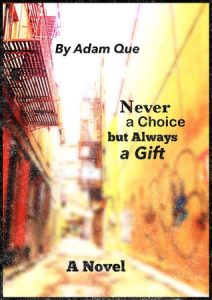★★★½
Delving into someone else’s mind can be an exhausting and exciting adventure, and in Never A Choice But Always A Gift, Adam Que artfully pulls back the curtain on the inner monologue of Max Kristoff. Once readers move past the frantic pace of the author’s thoughts, and have a chance to settle into the stream-of-consciousness style, the story begins to take on a vague shape. Max is an early 30-something with a dead-end job and a rather cynical view of life, whose attention and thoughts seem out of control, at times, but intriguing nonetheless.
Within the busy writing and unhinged energy of the narration, the author does bury some secret gems of wisdom: “Damn, how we just play roles, us humans. Sometimes we’d rather be a character than be ourselves. How sad and depressing; but I’m no angel myself. I’ve put numerous masks on my entire life.” These are the moments of self-reflection within the adrenaline-infused plot that give the author credibility as a writer, and drive readers to push through this unique and eccentric novel. When Max’s true circumstances are revealed, however, the devil-may-care tone of the story begins to make a bit more sense.
Shortly into the book, Max dives back into his past in an attempt to save Bibby, his old best friend. A subsequent visit to the hospital causes Max’s own past to rear up, reminding him that his life may be coming to an end in the very near future. With this new insight revealed to readers, the author speeds through the next few months, depicting even more personal tragedies for Max, the rise of a new relationship with a woman named Celeste, and attempts to reconnect once again with Bibby, despite his old friend’s apparent disinterest in a reunion. Flashbacks gradually reveal the extent of their old relationship, as well as the painful betrayals involved and some of the skeletons they’ve both kept buried in their respective closets.
The story takes on a more serious tone as Max’s bond with Celeste deepens and the mirror of his own mortality is held up before him. There are some things that simply can’t be buried in the past, no matter how perfect the present might seem, and certain realities simply need to be addressed. Max refuses to give up on his old friendship with Bibby, however, and even in the throes of his own personal hardships, Max feels compelled to help his friend find peace. Little does Max know that his final attempt at rebuilding that friendship might just cost him his life.
The writing throughout the novel is rough around the edges, reading like an unpolished journal or a hastily scribbled blog post, but at least it is consistent in that regard. The tone does have a very contemporary feel, clearly evidenced by the heavy modern references and the persistent attempts at slang speech. The author’s use of metaphor and simile is often forced and unnecessary, and could have been balanced with a variety of descriptive tools, although it does make for a dynamic read.
The dialogue was weak, in general, particularly during the interactions between Max and Celeste, which occasionally makes it hard to fully believe their relationship, possibly due to their constant use of pet names. As a whole, the novel is a rambling reflection on friendship, mortality, vulnerability and making up for past mistakes, but it is plagued with grammatical errors and common mistakes of first-time authors. While the emotions are powerful and the plot is interesting, the presentation of the story could be greatly improved for a better reading experience.
Links
Facebook
Twitter
Amazon
iBooks
Goodreads
Review Overview
Design
Editing
Content
Get an Editorial Review | Get Amazon Sales & Reviews | Get Edited | Get Beta Readers | Enter the SPR Book Awards | Other Marketing Services
























Leave A Comment